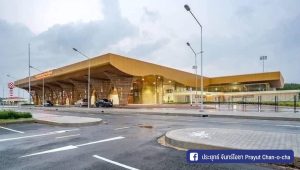Thailand’s Prime Minister Prayut Chan-o-cha has a particular fixation with “innovation.” His government has placed a high priority on upgrading infrastructure in all dimensions – air, land, and sea – to bolster the country’s long-term economic growth. This year alone, notwithstanding the enormous budgetary pressure exacerbated by the COVID-19 pandemic, the Prayut government has allocated a 1.4 trillion baht budget for 13 existing and 24 new transport infrastructure projects. This includes parts of the much-delayed high-speed rail project connecting Thailand to China via Laos.
As part of the air infrastructure development, the government invested 1.9 billion baht to build a brand-new international airport in Betong district of Yala province in Thailand’s predominantly Malay-Muslim southern border region. The airport’s construction on roughly 360 acres of land began in 2017. After several delays, the facility was formally opened on March 14 of this year.
Betong airport, as highlighted on Prayut’s official Facebook page, is intended to be “more than just an airport.” It is supposed to open a door of opportunity for the three impoverished southernmost provinces of Pattani, Yala, and Narathiwat, which have been stuck in economic stagnation since the escalation of the more than a century-old ethno-religious conflict in 2004. There is already one existing airport for commercial use in Narathiwat. However, given the region’s mountainous terrain and curvy roads, it is quite time-consuming to travel from Narathiwat to the other two provinces. Having another airport in the Thai border district of Betong would thus enhance the Deep South’s connectivity with the rest of Thailand and neighboring ASEAN nations.
Betong is arguably the most ideal tourist destination in the Deep South, thanks to its unique cuisine, long history of multiculturalism, natural wonders, and iconic landmarks, including Southeast Asia’s longest skywalk. The Prayut government has characterized Betong as a “tourism model city” under the national development plan to revitalize the insurgency-wrecked region. If the peace talks between the Thai government and the most powerful insurgent group, Barisan Revolusi Nasional (BRN), continue well without interruptions, it is anticipated that more Thai and Southeast Asian travellers will come to Betong. The war in Europe and rising travel costs in the post-pandemic world (including COVID testing and insurance fees as well as expensive airfares) will further discourage people from travelling to long-distance destinations, but Thailand is hopping to attract visitors from its neighboring countries.
In addition to increased tourist arrivals, cross-border trading in line with the Indonesia-Malaysia-Thailand Growth Triangle (IMT-GT) cooperation is expected to expand. Ultimately, economic growth in Betong will benefit the Deep South region as a whole. This, in the long run, will help alleviate local grievances and create a sense of belonging among the marginalized Malay-Muslim population, thereby lowering local support for the insurgents.
It all sounds very promising, until the practicalities are discussed. The troubled reality is that Betong airport has a short (1,800 meters) and narrow (30 m) runway, making it only accessible to ATR-72 or Q400 turboprop aircrafts. To make matters worse, Betong airport is not equipped with a fuel station, meaning that turboprop planes flying from Bangkok will have to either stop at another airport on the way to top up fuel or carry their own fuel tanks on board, which will lower the number of seats available. In any case, airlines have no choice but to significantly mark up their air tickets to maintain profitability, which obviously will not sell well. This explains why the low-cost Nok Air abruptly cancelled its Bangkok-Betong flights indefinitely just two days after the airport’s grand opening. Without government subsidies, it is going to be extremely difficult to get airlines to add Betong to their route network.
The foreseeable problems above, together with reports by several Thai media outlets – Bangkokbiznews, Nation Online, and Thansettakij – that Betong airport lacks sufficient funding to cover the operational costs are in stark contrast to the airport’s fancy bamboo-crafted design. That imbalance has shed light on the Thai government’s overemphasis on appearance and raised corruption concerns.
And, fundamentally, peace is a prerequisite for economic development. As long as the Deep South is perceived to be unsafe, most people will be reluctant to travel there, regardless of accessibility. Just last week, against the backdrop of the Thai government and the BRN’s Ramadan ceasefire agreement, bomb blasts killed a fisherman and injured three explosive ordnance disposal officers in Pattani. An armed unit of the Patani United Liberation Organization (PULO), which has been excluded from the peace talks, was behind the attack. This latest violence exposes the fragility of the peace process in the Deep South. Unless there is a major narrative change to be more inclusive, build more trust, and show more willingness to compromise on all sides, a peaceful resolution to the conflict in the Deep South is off the table.
At this point in time, it is still too early to dismiss the significance of Betong airport. Meaningful activities will have to wait until the total removal of COVID-19 border restrictions. That said, it is clear that the airport’s fortunes will rest upon the Thai government’s ability to address lingering operational challenges and the direction of the peace talks.

































